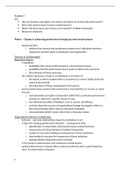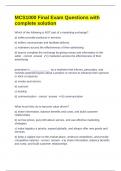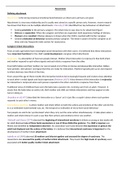Problem 5
LGs:
How are bonuses and salaries are used as incentives to increase job performance?
Does more money mean increase in performance?
What’s the best way to use money as an incentive? (related to bonuses)
(Keyword: nepotism)
Thierry – Chapter 6: enhancing performance through pay and reward systems
- Analysis by Kerr:
o believes that rewards and punishment systems don’t effectively reinforce
congruence between goals of employees and organization
Theories of Compensation
Expectancy theory:
- 3 cognitions:
o probability that a level of effort leads to a level of performance
o probability that this performance level causes to attain some outcomes
o attractiveness of these outcomes
- the relative importance of pay to an individual is a function of:
o the extent to which compensation is perceived as a way to satisfy particular
needs (instrumental)
o the importance of these needs/goals to the person
- pay-for-performance systems links performance characteristics to a bonus or salary
increase
o instrumentality perception is important: belief that a particular performance
outcome is related to a specific amount of pay
o also affected by quality of feedback, trust in system, self-efficacy
o cynicism about the success of organizational change has negative effect on
the instrumentality belief, reduces individual motivation
o instrumentality belief is lower when there a fixed pay system
Organizational behavior modification
- behavior – outcome relationships shape the motivation to act
- 5 steps for changing performance behavior – consequences links:
o identification of observable critical performance-related behaviors
o measurement of those behaviors’ baseline frequencies
o analysis of cues and contingent consequences of these behaviors
o intervention to increase the frequencies of these behaviors
o testing whether frequencies have increased
- 17% increase in performance with continuous reinforcement
- partial reinforcement: rewards follow actions less directly and in varied frequency
rates mixed results in humans
1
, Goal setting
- 4 conditions for high performance to occur:
o goals should be set at a high and difficult level
o goals should be specific
o feedback should be provided regularly
o employees must accept these goals
- moderating (ability, commitment) and mediating (persistence, task-specific
strategies) variables
- determinants of motivation: self-set goals and self-efficacy (inconclusive)
- pay for performance only motivates when the person believes this action is possible
- 3 strategies for pay-for-performance:
o all-or-none bonuses, this might challenge highly motivated people
o degree of success should be paid
o when self-set goals apply, rewards should be determined afterwards
Equity and Justice
- individual tries to achieve balance between his inputs and outcomes relative to the
perception of a referent’s input-outcome ratio
- inputs (abilities, education, effort) and outcomes (task performance, recognition,
compensation, critique)
- feeling of equity happens when your ratio is perceived as equal to referent’s ratio
- if this is not felt equal dissonance occurs
- when there’s dissonance the person tries to restore the balance, e.g. tries to change
input/output, cognitively reinterpret the situation, change the referent, or withdraw
from the situation, retaliation (less commitment, theft etc.)
- most effects occur in under-rewarded situations
- 3-way interaction of procedural, interactional and distributive justice:
o procedural justice: fairness of formal procedures
o interactional justice: fairness of interpersonal relations and treatments
o distributive justice: fairness of rewards received
- agreeableness and negative affect are factor of retaliation
Cognitive Evaluation Theory
- intrinsic motivation results from 2 basic human needs: the need to be competent and
the need for internal locus of causality of behavior
- what happens when an intrinsically motivated person gets an extrinsic reward like
pay-for-performance? 3 outcome properties:
o information: outcome informs the person about their competence level and
causes intrinsic motivation to continue
o Controlling: outcome is perceived as controlling the person, intrinsic
motivation will be less because locus of causality is external
o Amotivational: outcome has negative feedback, skills and competencies are
poor so intrinsic motivation decreases
- Nature of awards determines whether intrinsic motivation is affected:
2
LGs:
How are bonuses and salaries are used as incentives to increase job performance?
Does more money mean increase in performance?
What’s the best way to use money as an incentive? (related to bonuses)
(Keyword: nepotism)
Thierry – Chapter 6: enhancing performance through pay and reward systems
- Analysis by Kerr:
o believes that rewards and punishment systems don’t effectively reinforce
congruence between goals of employees and organization
Theories of Compensation
Expectancy theory:
- 3 cognitions:
o probability that a level of effort leads to a level of performance
o probability that this performance level causes to attain some outcomes
o attractiveness of these outcomes
- the relative importance of pay to an individual is a function of:
o the extent to which compensation is perceived as a way to satisfy particular
needs (instrumental)
o the importance of these needs/goals to the person
- pay-for-performance systems links performance characteristics to a bonus or salary
increase
o instrumentality perception is important: belief that a particular performance
outcome is related to a specific amount of pay
o also affected by quality of feedback, trust in system, self-efficacy
o cynicism about the success of organizational change has negative effect on
the instrumentality belief, reduces individual motivation
o instrumentality belief is lower when there a fixed pay system
Organizational behavior modification
- behavior – outcome relationships shape the motivation to act
- 5 steps for changing performance behavior – consequences links:
o identification of observable critical performance-related behaviors
o measurement of those behaviors’ baseline frequencies
o analysis of cues and contingent consequences of these behaviors
o intervention to increase the frequencies of these behaviors
o testing whether frequencies have increased
- 17% increase in performance with continuous reinforcement
- partial reinforcement: rewards follow actions less directly and in varied frequency
rates mixed results in humans
1
, Goal setting
- 4 conditions for high performance to occur:
o goals should be set at a high and difficult level
o goals should be specific
o feedback should be provided regularly
o employees must accept these goals
- moderating (ability, commitment) and mediating (persistence, task-specific
strategies) variables
- determinants of motivation: self-set goals and self-efficacy (inconclusive)
- pay for performance only motivates when the person believes this action is possible
- 3 strategies for pay-for-performance:
o all-or-none bonuses, this might challenge highly motivated people
o degree of success should be paid
o when self-set goals apply, rewards should be determined afterwards
Equity and Justice
- individual tries to achieve balance between his inputs and outcomes relative to the
perception of a referent’s input-outcome ratio
- inputs (abilities, education, effort) and outcomes (task performance, recognition,
compensation, critique)
- feeling of equity happens when your ratio is perceived as equal to referent’s ratio
- if this is not felt equal dissonance occurs
- when there’s dissonance the person tries to restore the balance, e.g. tries to change
input/output, cognitively reinterpret the situation, change the referent, or withdraw
from the situation, retaliation (less commitment, theft etc.)
- most effects occur in under-rewarded situations
- 3-way interaction of procedural, interactional and distributive justice:
o procedural justice: fairness of formal procedures
o interactional justice: fairness of interpersonal relations and treatments
o distributive justice: fairness of rewards received
- agreeableness and negative affect are factor of retaliation
Cognitive Evaluation Theory
- intrinsic motivation results from 2 basic human needs: the need to be competent and
the need for internal locus of causality of behavior
- what happens when an intrinsically motivated person gets an extrinsic reward like
pay-for-performance? 3 outcome properties:
o information: outcome informs the person about their competence level and
causes intrinsic motivation to continue
o Controlling: outcome is perceived as controlling the person, intrinsic
motivation will be less because locus of causality is external
o Amotivational: outcome has negative feedback, skills and competencies are
poor so intrinsic motivation decreases
- Nature of awards determines whether intrinsic motivation is affected:
2










